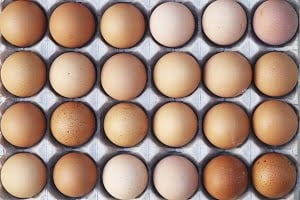I love eggs.
I eat them almost every day, for breakfast, lunch, dinner, or a snack. I eat them on their own, with some cheese, on a Caesar salad, in soup, or on a sweet potato. I like them boiled, fried, sunny side up, over easy, poached, or benedicted. Any way, any time, any meal- I love eggs.

Of course, loving eggs so much doesn’t come without questions, specifically my cholesterol. For the record, my cholesterol is pretty low and always has been despite the egg consumption. But if you’re worried about cholesterol in eggs, don’t fret. The 2015 Dietary Guidelines states that dietary cholesterols does not play a major role in blood cholesterol, adding that many more important factors affect blood cholesterol.
Ok, so now that the cholesterol question is still out of the way, I know what you’re thinking: Should I eat the yolk or the egg white? It’s a good question, but one where we need to take a quick peak into the anatomy of an egg. If the egg was fertilized, the yolk, or the yellow part of the egg, would provide the nutrition to the growing chicken, while the egg white protects the yolk from damage.
Still following? Great! With all of this in mind, most of the nutritional value comes from, you guessed it, the yolk. Crazy, I know, but I’m not yolking you. The yolk contains fat soluble vitamins like vitamin A, D, E, and K; water soluble B vitamins like B1, B2, B3, B5, B6, B12; choline; biotin; folic acid; and minerals like iron and calcium. Vitamin A, D, and E supports immune health, and Vitamin K helps blood to clot, preventing excessive bleeding. Vitamin A, D and calcium helps to support bone health. The B vitamins help in cell growth, as well as regulating the metabolism, and biotin converts food into energy and metabolizes fats and protein. Eggs yolks also contain polyunsaturated and monounsaturated fat, which have been shown to support a healthy cardiovascular system.
 What about the egg white? The egg white contains the protein, and it’s a complete protein. That means that it contains all the essential amino acids in the right amounts. But the egg white isn’t the only place protein is found in an egg. While the white does contain 57% of the protein, the yolk contains 43% (egg whites have 3.6g of protein, while the yolk has 2.7g). The egg whites also have less calories, only 17 compared to egg whites 55. So egg whites are actually an alternative to eating a whole egg if you’re focusing on your calorie intake. For example, if you are used to eating a 3-egg omelette, but you want to limit calorie and saturated fat intake, you can replace 1 egg with an egg white. However, remember that the fat in the yolk and protein in the whites contribute to satiety (feeling full and satisfied) so sometimes the whole egg may be the best option to avoid overeating later.
What about the egg white? The egg white contains the protein, and it’s a complete protein. That means that it contains all the essential amino acids in the right amounts. But the egg white isn’t the only place protein is found in an egg. While the white does contain 57% of the protein, the yolk contains 43% (egg whites have 3.6g of protein, while the yolk has 2.7g). The egg whites also have less calories, only 17 compared to egg whites 55. So egg whites are actually an alternative to eating a whole egg if you’re focusing on your calorie intake. For example, if you are used to eating a 3-egg omelette, but you want to limit calorie and saturated fat intake, you can replace 1 egg with an egg white. However, remember that the fat in the yolk and protein in the whites contribute to satiety (feeling full and satisfied) so sometimes the whole egg may be the best option to avoid overeating later.
One more thing to note about eggs, they do contain some saturated fat, which can increase blood cholesterol. If you are trying to lower your cholesterol, that’s another situation to consider eating only the egg whites, or avoiding or limiting other sources of saturated and trans fat.
So, there you have it! Eggs, the yolk and whites included, can be part of an eggs-ellent and healthy diet. Now, I’m going to get my eggs on and enjoy an egg salad sandwich.
